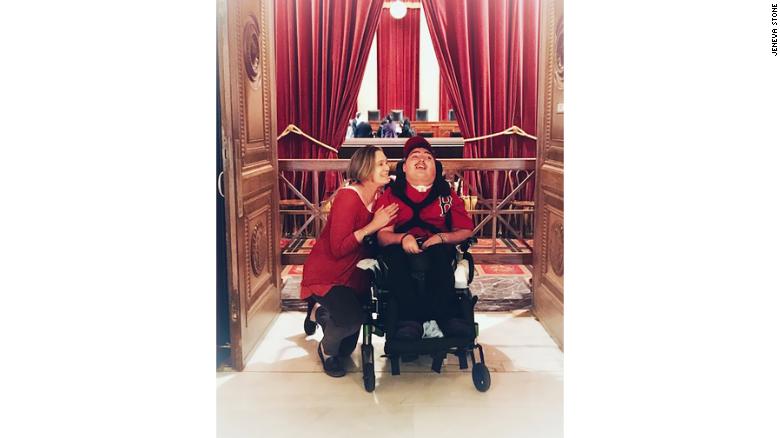Jeneva Stone lives with her husband and their two sons in Bethesda, Maryland. The views expressed in this commentary are her own. View more opinion on CNN.
My son Rob is 23 years old. He follows politics, enjoys sips of whiskey, and loves baseball. He also has a rare form of dystonia, a feeding tube, and a tracheostomy, among other pre-existing medical conditions. He uses a speech-generating computerized device to communicate with us. If the Affordable Care Act (ACA) were struck down by the Supreme Court after the addition of Judge Amy Coney Barrett, a mother of a disabled child herself, Rob would be uninsurable, like so many of his disabled peers.
On October 12, 2018, I rolled my son Rob in his wheelchair to the U.S. Supreme Court for a tour. The sky that day was as bright blue as the cape he wore. I have a photo of him posing at the bottom of the famous icy white marble steps, smiling because we believed the court would continue to protect his right to health care — but now it feels like we may have been wrong.
You’d think that Barrett would understand what is at stake for my son and millions of other disabled Americans. But at her hearing, she would not go on the record about her views on the ACA and simply said she was “not hostile” to it — that is not enough for me. She has previously shown her opposition to the court’s ruling when it voted against overturning the ACA twice, showing no hint of empathy.
Rob was born in 1997, long before the ACA was passed in 2010. For over a decade, my husband and I surfed the edge of financial ruin, ineligible in Maryland for a Medicaid waiver to assist us with Rob’s medical care. The few job changes we made were fraught with anxiety — a single misstep, leaving an insurance gap of only a single day, would mean Rob’s care would be dropped by our new employer. If the ACA had not passed, I don’t know where we would be financially.
Then there were the denials. Feeding Rob depended on three pieces of medical equipment: a port implanted in his stomach, an “extension” tube that plugged into the port, and a 60cc syringe into which we’d pour his formula. Our insurer at the time denied the extension tubes, which cost hundreds of dollars per month, referring to the tube as an “artificial esophagus,” and saying our plan didn’t cover prosthetic devices. The claims representative cheerfully said at least they covered the formula and syringes. I was devastated.
A case manager for another insurer routinely called my son’s physical and speech therapists to badger them, at one point actually screaming at each of them. She told Rob’s speech therapist that Rob already had a feeding tube — what was the point of trying to help him eat at all? It was exhausting to battle the insurance company for every need.
And we had what was considered “good” private insurance. Imagine that. We gave up vacations, home improvements, after school activities for our children, and instead poured all our money into health insurance.
After a decade of the Affordable Care Act, my family’s life has significantly improved. We’re no longer terrified we’ll lose our home, which we’ve made wheelchair accessible for Rob. Before the ACA, we regularly switched insurers to avoid maxing out on annual or lifetime caps. We now know we can stick with the same, good plan.
After Rob’s visit to the Supreme Court, he wrote a poem. These are its closing lines: “better bad awful / awful bad, like the Supreme Court building is beautiful / this is the chamber where the Justices hear cases.” Rob often puts together strings of adjectives in his poems, and you can hear his concern about the court’s power in the transition from “better” to “awful bad.” At the same time, he acknowledged the awe and hope he saw in the building itself that day. Rob captured the fear and hope with which all of us with pre-existing conditions and high medical needs regard the Supreme Court balance.
Get our free weekly newsletter
Sign up for CNN Opinion’s new newsletter.
Let me bear witness to the terrifying times prior to the ACA. We cannot go back. I feel so strongly about this that I’ve joined Little Lobbyists, a family-led organization that advocates for children with complex medical needs and disabilities. Their mission, as is mine, is to ensure that no family has to endure uncertainty about health care again. I’ve become their blog manager, helping to share the stories of families like mine. Rob and I have accompanied the Little Lobbyist team to Capitol Hill, at press conferences, and at presidential campaign events.
The confirmation of Amy Coney Barrett represents an unprecedented threat to the ACA and at-risk families like mine. Our country is in the middle of a pandemic. Now is not the time to play politics with the lives of millions of Americans.
>>>>


